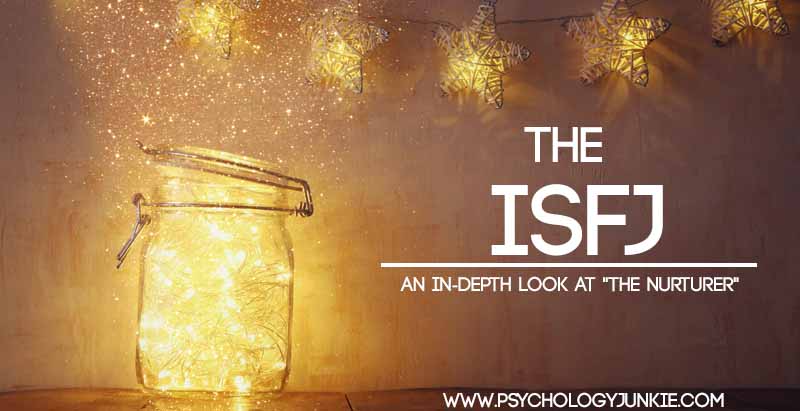The ISFJ Personality Profile – An In-Depth Look At “The Nurturer”
“Love begins at home, and it is not how much we do… but how much love we put into that action.”
– Mother Teresa, a rumored ISFJ
ISFJs are one of the more common Myers-Briggs® personality types, making up roughly 13.8% of the US population. They are known for their empathy, compassion, and sensible, level-headed nature. ISFJs pair a gentle, nurturing soul with a practical, no-nonsense way of looking at life. While they may be a relatively common type, I’ve never met two ISFJs who were the same. There is, as with all types, a lot of variety from person-to-person.

ISFJs have many titles including “defender,” “nurturer,” and “protector.” and all these titles try to convey what ISFJs are so good at – taking care of not just individuals, but communities, values, and positive traditions.
Not sure what your personality type is? Take our new personality questionnaire here. Or you can take the official MBTI® here.
Table of contents
Estimated reading time: 12 minutes
The ISFJ Function Stack:
Dominant Function: Introverted Sensing (Si)
Auxiliary Function: Extraverted Feeling (Fe)
Tertiary Function: Introverted Thinking (Ti)
Inferior Function: Extraverted Intuition (Ne)
ISFJ Sensing
The driving force or strength of the ISFJ often lies in their dominant function, Introverted Sensing, or “Si” for short. Introverted sensing gives ISFJs a profound knowledge of their past experience and what they can learn from it. They pay close attention to meaningful details and facts to determine what can be relied upon and depended upon. They test their memory and the experiences they’ve lived through to decipher what can be believed and trusted. They can often recall with stunning detail memories and reflections that other people have forgotten; and in fact, they don’t just remember the concrete details, but they can remember exactly how those experiences made them feel inside.
ISFJs use the information they gather to compare new experiences to the past to determine what lessons can be learned, what obstacles can be avoided, and which methods provide the most security and dependability. One of the reasons ISFJs are often referred to as “protectors” is that they are highly attuned to what will provide security and safety. They are very fond of tried-and-true techniques that have been proven to work again and again through history and life experience.
When it comes to details, ISFJs have an attention for them that is astounding to many other types. They are often the first to notice when someone changes the decor in a room or when there’s an inconsistency in a pattern or behavior. When it comes to their work, they bring this same attention to detail, embodying a focus and care that is impressive.
As Introverted Sensors, ISFJs have vivid sense-impressions of everything they see. If they look at an apple they might suddenly be reminded of climbing their grandmother’s apple tree and the feel of the crisp fall breeze. They might see a rocking chair and be reminded of listening to stories on their mother’s lap as a child and the warm comfort of her presence. Everything has meaning and personal history, and ISFJs are excellent at preserving that history and bringing it to future generations.
Do ISFJs Remember Everything Perfectly?
One of the misconceptions about introverted sensing is that Si-doms have a nearly photographic memory. This isn’t exactly true. An ISFJ determines what is important to him or herself and then remembers the details of those particular things. One ISFJ might have a fondness for vintage fashion and so remember every detail about the styles of dress from the 1930s, another ISFJ might be interested in building customized computers, so they might remember everything about how different computers are engineered. What ISFJs remember usually pertains to something that is personally significant to them. Sometimes it’s not so much the concrete details that they remember (although they tend to be good at that), it’s how something made them feel in the past, how it impressed them, what it meant to them. Introverted sensing is about sense-impressions and individual meaning. It is not as literal and concrete as many descriptions imply.
ISFJ Feeling
After sensing, ISFJs have a strong preference for Extraverted Feeling, or “Fe” for short. Feeling supports and balances the ISFJ’s sensing function, making a powerful impact on their decisions and how they relate to other people in their lives. ISFJs are highly attuned to the needs of the people around them, to how they feel, and to unexpressed desires and emotions. They are often tireless in their efforts to bring harmony and practical service to people in their community.
When ISFJs make decisions, they will try to step into situations to consider how those decisions will impact the people involved. They may know a lot of the logical pros and cons and facts of the matter, but they will focus first on maintaining harmony and sticking to their values and ethics. ISFJs are extremely driven by their core values; they are very devoted to what they believe is right, what they believe is fair, and what they believe is in the best interests of the people they care about. They place great importance on treating others with respect and have no patience for “trolling” or rudeness.
ISFJs combine sensing and feeling into a common-sense, hands-on way of serving others. ISFJs don’t just listen to your problems, they want to provide real, tangible solutions. If you look at influential ISFJs you can see this in their lives; people like Mother Teresa and Rosa Parks who have worked hard to make the world a better place for others in real, revolutionary ways.
ISFJ Thinking
The third-strongest mental process of the ISFJ is called Introverted Thinking, or “Ti” for short. Ti is all about searching for accuracy, classifying data internally, and understanding the logical principles behind how everything works. ISFJs don’t usually develop strong use of Ti until they are in their 20’s or 30’s, at which point they thoroughly embrace it. Ti becomes a source of creativity and relief, adding objective balance to their decisions and giving them a stronger desire to find accuracy in their experiences and opinions. They test their ideas and viewpoints to see whether they stand up to logical scrutiny.
ISFJs who are developing Ti tend to be very careful about word usage and they enjoy analyzing problems logically and categorizing data into finely-tuned inner volumes. When they have to make a decision that will affect others, they will nearly always value feeling overthinking. They will ask themselves, “what choice will benefit people the most?”. But when they’re making a decision that only impacts themselves, ISFJs will often look at the logical approach and impersonal data to move forward.
Many ISFJs feel torn between thinking and feeling when they make a decision. On one hand, the harmony of others is extremely important to them. On the other hand, they usually are quite aware of the inaccuracies of other people’s decisions, so they can struggle with figuring out how to balance the two opposing views. Choosing tact and empathy over logic is more comfortable in their younger years, but as ISFJs grow and mature, they find themselves more drawn to a logic-first approach.
ISFJ Intuition
The inferior function of the ISFJ is called Extraverted Intuition, or “Ne” for short. This process is all about finding interconnections and abstract relationships between random external objects, ideas, and stimuli. It’s very good at seeing numerous theoretical ideas and possibilities. As ISFJs enter their 50’s and beyond, this function starts to develop more consciously. Before this time ISFJs may dismiss new, untested ideas because they see them as too risky. They want to see hidden meanings and connections, but without tested, provable facts to back up their ideas they tend to pass them off as unworthy of their time.
The inferior nature of intuition causes many ISFJs to feel random bouts of apprehension or even dread about the future. Because they prefer the world of experience and trusted facts (Si) they can feel that any number of terrible things await them in the future. They can have difficulty imagining possibilities without worrying about all that could go wrong. The younger the ISFJ is the worse this problem tends to be for them. This doesn’t mean that they hate intuition, though. They still feel an unexplainable pull towards understanding it and navigating abstract, theoretical avenues. Many times they find safe outlets for their intuition through reading fantasy or sci-fi novels, playing creative games, or theorizing about the relationships or futures of people they know.
As ISFJs age and mature, they begin to develop and take more interest in intuition. This results in a fondness for brainstorming and following new possibilities to see where they go. They tend to enjoy more spontaneity, become more trusting of their insights, and more intrigued by abstract concepts. The future begins to feel less worrisome and more fascinating.
When ISFJs are extremely stressed, they may fall into the grip of Extraverted Intuition. When this happens, they can seem like totally different people. They tend to see nothing but negative, ominous possibilities for the future. They often feel inadequate and insecure about all the potential disasters that could befall them or their loved ones. They stop trusting in facts and details and lose sight of what they know to be dependable. They can become angry, irritable, and pessimistic. Many times they feel emotionally overwhelmed and unable to focus because their mind is fraught with so many negative ideas and images of the future.
You can find methods for getting out of a stressful experience like this here.
ISFJs in Relationships
ISFJs are known for being gentle, compassionate, and responsible partners. They are often tireless in their efforts, putting their loved one’s needs ahead of their own and looking for practical ways to show they care. Many ISFJs report that they struggle to say no to the needs or desires of their families; so much so that they can become burned out. It’s important for ISFJs to make time for themselves and their own desires and count themselves among the people they should care for!
ISFJs are very private individuals and it takes time to get to know them. They are rarely “open books” and usually need plenty of encouragement and loyalty before they are willing to share their deepest feelings and hopes. They are especially sensitive to criticism and conflict and they tend to avoid relationships with people who are overly critical and harsh. They want to be with someone that will build a storehouse of beautiful memories with them. They want a relationship that will last, where mutual respect is freely given, and where there is 100% trust. They also want someone who is attentive and will take the time to listen to them and show appreciation for the kind things they do that often get taken for granted.
It’s very important for them to know that they can depend on their partners and trust them. Wishy-washy behavior and inconsistency by their partners will cause them a great deal of stress. They want to know that this relationship has the strength to last and long-term security.
ISFJs listed commitment, fidelity, mutual support, attentiveness, companionship, and shared values as their most important aspects of a relationship.
ISFJ Strengths:
Practical: ISFJs are very down-to-earth and grounded individuals. They are good at making sure daily needs are met; whether that means knowing how to replace a tire or get the bills paid on time. They like to know how to take care of themselves and their loved ones and how to be prepared.
Empathetic: ISFJs are extremely compassionate and devoted individuals. They easily pick up on the moods and emotions of other people and try to understand them on a deeper level. This empathy often draws them to career fields in psychology, religion, social work, or teaching.
Focused: ISFJs have an intense focus on whatever task is at hand. They are good at detail-oriented work and making sure that everything they work on meets their high standards.
Responsible: ISFJs are very meticulous and reliable people. They believe in keeping their word and showing up for their loved ones, even when it may be inconvenient. They tend to go above and beyond what is expected of them when it comes to taking care of their friends, families, and community.
Hard-Working: ISFJs are known for their strong work ethic. They believe in work before play and tend to get their tasks finished way ahead of schedule.
Practically Imaginative: ISFJs pride themselves on keeping a level head, but this doesn’t mean they don’t have imagination! ISFJs draw from their experience and attention to sensory details to create beautiful ideas and opportunities. They can be very creative in a hands-on way with crafts, building, parenting, etc,..
ISFJ Weaknesses:
They Can Forget Their Own Needs: ISFJs tend to work so hard to take care of their loved ones that they forget themselves in the process. It’s important for them to make time for their own self-care and their own interests. ISFJs have a high rate of burnout, and forgetting self-care and relaxation is the main culprit. In fact, according to the MBTI® Manual, ISFJs rank second-highest on both “emotional exhaustion” and “depersonalization” burnout scales.
Overly-Sensitive: ISFJs tend to take criticism personally, and can have trouble separating constructive and personal criticism. They may berate themselves or become angry too easily over criticism or conflict.
Fearful of Change: Because ISFJs value routine, tradition, and their past experience so highly, they may shut down new experiences and ideas too hastily. It’s important for them to take time to look at new possibilities before shutting them down.
Prone to Emotional Burnout: Because ISFJs tend to absorb the emotions of people around them, and because they are so private about their own emotions, they can become emotionally overloaded and burned out. They may feel that they are constantly taking on other people’s worries, cares, and fears and not finding an outlet for their own worries, cares, and fears. It’s important for them to have at least one person they can talk to about their own emotions and feelings.
Fun Facts About the ISFJ Personality Type:
Facts are taken from the MBTI® Manual – Third Edition
– ISFJs are the second most frequent type among education majors.
– ISFJs are rated by psychologists as one of two types least likely to have trouble in school.
– The most important feature of an ideal job for an ISFJ is a stable and secure future.
– ISFJs are overrepresented among male small business owners compared with a national sample.
– ISFJs show occupational trends in the following: education, health care, religion.
– ISFJs prefer learning practical skills in school.
What Are Your Thoughts?
Has this article been helpful? Is there anything you’d like to add about the ISFJ personality type? Let us know in the comments! Find out more about your personality type in our eBook, Discovering You: Unlocking the Power of Personality Type.

Other Articles You Might Enjoy:
10 Things You’ll Relate to If You’re an ISFJ
Self-Care for Each Myers-Briggs® Personality Type
The Timeless Power of Introverted Sensing
What Each Myers-Briggs® Type Needs in a Relationship














This is so accurate! Especially the decision making order – if it’s something that will effect others I prioritise Fe over Ti, but decisions effecting only myself in my 20s and now 30s have been more Ti based.
I’m also much better with change since learning about my type and that it’s a weakness. If I focus on Fe (this change will help others) and Ti (analysis shows the benefits of this change) I find I cope just fine. I’ve even learnt to talk to dominant Ne types to find the positive future possibilities so I don’t get caught in the negative ones.
For years I’ve been looking to and relating to an ISTS. But after reading this article, I relate and agree mostly with the personality of ISFJ. I don’t know why I hadn’t noticed this before?
I meant, I called myself a ISTJ.